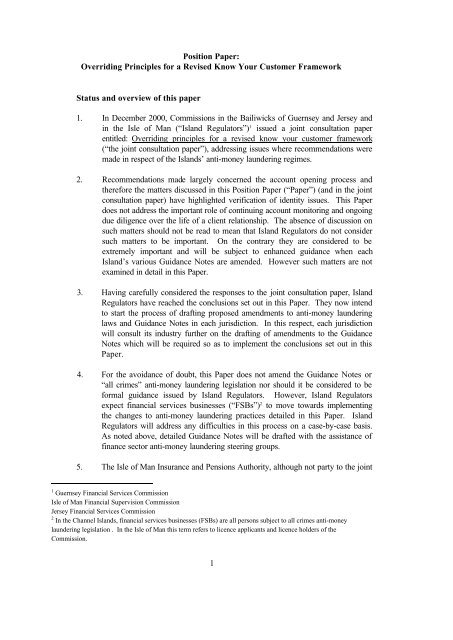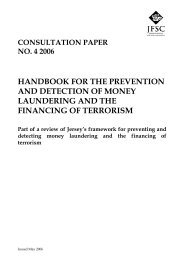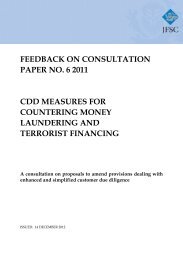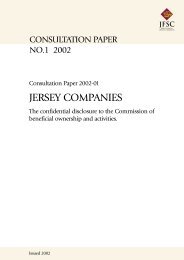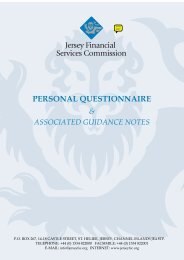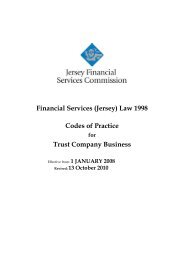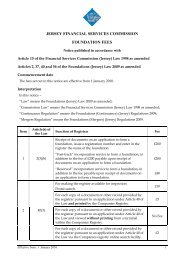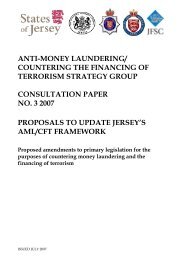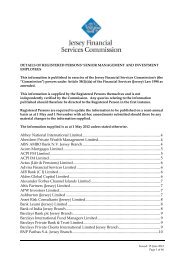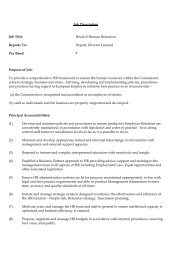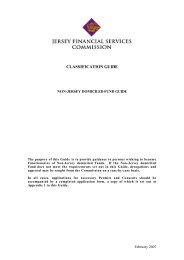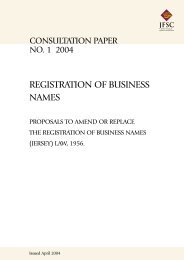Overriding Principles for a Revised Know Your Customer Framework
Overriding Principles for a Revised Know Your Customer Framework
Overriding Principles for a Revised Know Your Customer Framework
Create successful ePaper yourself
Turn your PDF publications into a flip-book with our unique Google optimized e-Paper software.
Position Paper:<strong>Overriding</strong> <strong>Principles</strong> <strong>for</strong> a <strong>Revised</strong> <strong>Know</strong> <strong>Your</strong> <strong>Customer</strong> <strong>Framework</strong>Status and overview of this paper1. In December 2000, Commissions in the Bailiwicks of Guernsey and Jersey andin the Isle of Man (“Island Regulators”) 1 issued a joint consultation paperentitled: <strong>Overriding</strong> principles <strong>for</strong> a revised know your customer framework(“the joint consultation paper”), addressing issues where recommendations weremade in respect of the Islands’ anti-money laundering regimes.2. Recommendations made largely concerned the account opening process andthere<strong>for</strong>e the matters discussed in this Position Paper (“Paper”) (and in the jointconsultation paper) have highlighted verification of identity issues. This Paperdoes not address the important role of continuing account monitoring and ongoingdue diligence over the life of a client relationship. The absence of discussion onsuch matters should not be read to mean that Island Regulators do not considersuch matters to be important. On the contrary they are considered to beextremely important and will be subject to enhanced guidance when eachIsland’s various Guidance Notes are amended. However such matters are notexamined in detail in this Paper.3. Having carefully considered the responses to the joint consultation paper, IslandRegulators have reached the conclusions set out in this Paper. They now intendto start the process of drafting proposed amendments to anti-money launderinglaws and Guidance Notes in each jurisdiction. In this respect, each jurisdictionwill consult its industry further on the drafting of amendments to the GuidanceNotes which will be required so as to implement the conclusions set out in thisPaper.4. For the avoidance of doubt, this Paper does not amend the Guidance Notes or“all crimes” anti-money laundering legislation nor should it be considered to be<strong>for</strong>mal guidance issued by Island Regulators. However, Island Regulatorsexpect financial services businesses (“FSBs”) 2 to move towards implementingthe changes to anti-money laundering practices detailed in this Paper. IslandRegulators will address any difficulties in this process on a case-by-case basis.As noted above, detailed Guidance Notes will be drafted with the assistance offinance sector anti-money laundering steering groups.5. The Isle of Man Insurance and Pensions Authority, although not party to the joint1 Guernsey Financial Services CommissionIsle of Man Financial Supervision CommissionJersey Financial Services Commission2 In the Channel Islands, financial services businesses (FSBs) are all persons subject to all crimes anti-moneylaundering legislation . In the Isle of Man this term refers to licence applicants and licence holders of theCommission.1
Backgroundconsultation paper, is fully supportive of the highest standards in the internationalfight against money laundering. In this respect it will be consulting independentlywith its market on proposals <strong>for</strong> further changes to its Guidance Notes.6. Island Regulators issued the joint consultation paper in response to:a) positive evaluations conducted in 1999 by the Offshore Group of BankingSupervisors (OGBS) and in 2000 by the Financial Action Task Force(“FATF”) as part of its review of non-cooperative countries andterritories; andb) a commitment to remove opportunities <strong>for</strong> arbitrage between the CrownDependencies in areas related to financial crime and money laundering.7. Approximately 60 responses were received in each jurisdiction. This included aresponse from the Isle of Man IPA which was not party to the originaldocument, but which did circulate copies to life insurance licence holders in theIsle of Man <strong>for</strong> comment.8. Briefly, the overriding principles proposed were:a) a requirement to know and verify the identity of all customers and, ifdifferent, the principals behind those customers;b) a requirement to hold copy documentary evidence used to verify identityof customers, and, where different, the principals behind those customers;c) a restriction on those who might be relied upon to introduce businesswhere an accepting person 3 is able to rely on verification of identityconducted by another person;d) a common list of jurisdictions considered to have equivalent anti-moneylaundering legislation (“equivalent jurisdictions” 4 );e) implementation of a “progressive programme” to verify the identity ofcurrent customers which were taken on be<strong>for</strong>e the introduction of allcrimes anti-money laundering legislation in each jurisdiction; andf) re-examination of the identification exemption <strong>for</strong> relationships openedusing the “postal concession” 5 .3 Accepting person refers to a person that has been requested to establish a relationship with an applicant <strong>for</strong>business. Person includes natural persons and any bodies of persons corporate or unincorporate.4 Italicised words used in this Paper are defined at appendix 1.5 In summary, products opened by post, telephone, or electronic transfer which do not offer third party transmissionfacilities (and which cannot be transferred to an account offering such transmission facilities), where funds originate2
9. Generally, the pan-Island approach was welcomed by respondents to the jointconsultation paper, as was the proposal to produce a joint list of equivalentjurisdictions. A number of common concerns were also identified inconsultation responses.a) Many were critical of the “paper chase” that would result from therequirement to hold copy documentation <strong>for</strong> all customers (and principalswhere different) at each location offering products, and questioned thevalue of obtaining such documentation from other parties, particularlywhere it might now be out of date (e.g. passports).b) Many thought that accepting persons should be entitled to continue to relyupon an undertaking to provide identification documentation on demand,on the basis that such undertakings would be provided only by regulatedpersons in equivalent jurisdictions. They also considered that receipt ofidentification documentation at the start of a business relationship placedan effective obligation on the accepting institution to re-verify identity, andevidenced mistrust of anti-money laundering procedures adopted in FATFcountries and in the Crown Dependencies.c) Many were also concerned that the Islands should not move ahead ofanti-money laundering procedures in place in FATF countries (identifyingan adverse economic impact in doing so). Reference was often made toLuxembourg, the Republic of Ireland, Switzerland and the UnitedKingdom (“UK”).d) The proposal to require accepting persons to verify the identity ofprincipals of applicants <strong>for</strong> business 6 (including trust beneficiaries) and tohold copy documentation <strong>for</strong> such principals attracted some support butmany practical and legal difficulties were highlighted, e.g. obtaining suchin<strong>for</strong>mation from “secrecy” jurisdictions (and in all probability anyjurisdiction with confidentiality and data protection requirements), andconstructive trust issues. Others questioned the value in verifying theidentity of discretionary beneficiaries (particularly where they weremembers of the settlor’s family).e) A number thought that proposals in respect of “pooled” and clientaccounts would inevitably lead to their undesirable use as a means ofcircumventing the general requirement to hold copies of identificationdocumentation.f) Responses to the proposal <strong>for</strong> a “progressive programme” werepolarised. A number of respondents remarked that they had alreadyfrom a specified institution.6 A person or persons seeking to <strong>for</strong>m a business relationship, or to carry out a one-off transaction, with a personwho is carrying on any financial services business.3
started a programme to verify the identity of customers pre-dating eachjurisdiction’s “all crimes” anti-money laundering legislation (indeed somehad already completed such a process), but most opposed the proposal.Those opposing the proposal did so because:i) few other jurisdictions had applied identification requirements toaccounts pre-dating anti-money laundering legislation (and somehad introduced “grand-fathering” provisions to specificallyexclude existing accounts from verification);ii)iii)iv)they believed that the absence of such documentation presentedlittle risk to their business and would amount to no more than a“box-ticking” exercise;difficulties were anticipated in dealing with long establishedcustomers, and those who were not prepared to provide thedocumentation requested;they were uncertain as to the procedures to be followed wherethe identity of existing customers could not be verified; andv) they considered the cost and resourcing implications of theproposals to be unreasonable.g) Those in the Channel Islands commenting on the re-examination of the“postal concession” were reluctant to remove the concession whilst itwas still available in the UK and Republic of Ireland. Those in the Isle ofMan highlighted the inequity of the concession’s availability in theChannel Islands and UK, but not in the Isle of Man.10. As discussed above, many respondents commented on the need to be able tocompete on equal terms with other jurisdictions. As a result, Island Regulatorshave considered (and will continue to consider) the deliberations of the FATF,Basel Committee on Banking Supervision/OGBS Working Group on Cross-Border Banking (“the Cross Border Group”), the UK Joint Money LaunderingSteering Group, the European Union’s (“EU”) revised anti-money launderingdirective, and the IAIS anti-money laundering guidance notes <strong>for</strong> insurancesupervisors and insurance entities, and believe that proposals set out in this Paperare broadly in line with international standards and discussions, whilst recognisingthat ef<strong>for</strong>ts will also be required in other jurisdictions if Island businesses are tobe able to compete on equal terms.The FATF is currently engaged in a review of its 40 Recommendations. It willissue options papers later in 2002 and expects to conclude its review in 2003.Island Regulators do not expect this review to fundamentally alter the customeridentification principles set out in this Paper. Other matters arising from theFATF’s review will be taken into account in the drafting of amendments to antimoneylaundering laws and Guidance Notes in each jurisdiction.4
The requirements of the United States’ USA PATRIOT Act of 2001 (e.g. therequirement that US banks be in a position to identify underlying customers ofbanks <strong>for</strong> which they act as correspondent) serve to emphasise the need <strong>for</strong> theIslands to continue to develop anti-money laundering systems that meet globalrequirements.11. Since February 2001, Island Regulators have held a series of joint meetings toconsider the above and to prepare a position paper reflecting current thinking.<strong>Revised</strong> overriding principlesHeadings in bold type below follow those used in the joint consultation paper.12. <strong>Know</strong>ing client identityIn the joint consultation paper, respondents were asked to comment on:a) the proposal that, in addition to being required to know the identity of all(underlying) customers, accepting persons should be in possession of acopy of identification documentation;b) the proposal that certain persons described in the joint consultation papershould be considered to be the underlying principals <strong>for</strong> a number ofcommon business relationships; andc) what percentage should be considered to be appropriate <strong>for</strong> the deminimis provisions <strong>for</strong> companies.13. Clarification was requested on the definition of identity of natural persons. In thecase of natural persons, Island Regulators consider identity to comprise name(and any <strong>for</strong>mer names), residential address, date of birth, place of birth, andnationality. The essential elements of customer identification are currently underreview by the Cross Border Group.14. As a general principle, Island Regulators consider that the identity of an applicant<strong>for</strong> business and any underlying principals should be established and verifiedbe<strong>for</strong>e a relationship is established, and certified copies (or originals <strong>for</strong> utilitybills and the like) of all relevant documentation pertaining to identity should beheld by an accepting person (“documentary evidence”). Some exceptions to thisprinciple will be considered and addressed at the time that the Guidance Notesare updated, <strong>for</strong> example:• one-off transactions (where the amount of the transaction or series of linkedtransactions does not exceed an agreed monetary amount) 7 ; and7The Guernsey Financial Services Commission discourages its registered insurance intermediaries from takingadvantage of the exemption <strong>for</strong> small one-off transactions where such transactions involve single premium5
• policies of insurance with no surrender value (however, strict guidance willbe required <strong>for</strong> cancelled policies where premiums are returned).Exceptions to this general principle are under review at the current time by theFATF. Island Regulators will wish to ensure that applicants <strong>for</strong> business are notable to benefit from such exceptions where a relationship is intentionallystructured so as to avoid identification requirements.15. <strong>Know</strong> your customer/ customer due diligenceRespondents to the joint consultation paper also requested clarification onrequirements in relation to establishing source of wealth and source of funds.Island Regulators believe that an accepting person will wish to establish a profile<strong>for</strong> an applicant <strong>for</strong> business to enable it to satisfy its obligations under “allcrimes” anti-money laundering legislation. This is commonly referred to as“know your customer” or “customer due diligence”.An accepting person should always understand why an applicant <strong>for</strong> businesshas requested a particular product or service, that person’s expected activity, andthe source of funds <strong>for</strong> the transaction in question. Where the type of product orservice being offered makes it appropriate to do so, or where the product orservice is not consistent with in<strong>for</strong>mation held on the applicant, an acceptingperson should also establish the source of wealth of the person applying <strong>for</strong> theproduct or service. The in<strong>for</strong>mation required to establish a profile, and themeans by which it is obtained, will depend, inter alia, on product and applicant <strong>for</strong>business.16. Who should be considered a principal?As a general principle, Island Regulators consider that an accepting personshould identify the beneficial owners of, those who have control of, and thosewith a beneficial interest in any relationship established (referred to in this Paperas “principals”).Where this Paper proposes a concession which limits application of thisimportant principle, then an accepting person should always carefully assesswhether an applicant <strong>for</strong> business has structured itself so as to avoid theidentification of underlying principals. Where it considers that an intendedrelationship has been so structured, then it must not apply a concession.Each concession will be available only in controlled circumstances.Often, an accepting person will need to place reliance on another person to namethe underlying principals behind a relationship, <strong>for</strong> example, the directors of aprivate company to name the shareholders of that company, and a trustee totransactions <strong>for</strong> life policies.6
name the settlor and beneficiaries <strong>for</strong> a trust. In considering whether or not toenter into a relationship, and as part of its ongoing assessment of thatrelationship, an accepting person should be satisfied that all principals have beennamed.Notwithstanding the need to monitor activity on a relationship which falls outsidea regular pattern, and the need to hold evidence of identity of principals, anaccepting person is not expected to seek in<strong>for</strong>mation (as a matter of course) toenable it to assess whether or not the recipient of a payment or transfer of assetshas a right to it (unless it already has some legal requirement to do so).17. Specifically, the following should be considered principals <strong>for</strong> the purposes ofverifying identity:a) Deposits placed by banks with other banks in a “fiduciary” capacity (mostcommonly with Swiss banks) and pooled client accounts opened byprofessional intermediaries 8 .Professional intermediaries frequently hold funds on behalf of their clientsin “client accounts” opened with other financial services businesses.Similarly banks (typically branches or subsidiaries of Swiss banks)receive deposits placed on a fiduciary basis held in pooled accounts.Where such accounts are held in general “omnibus” accounts, holding thefunds of many clients, and where the intermediary (or, where a bank isplacing a fiduciary deposit, the bank) is both regulated and operating inthe Bailiwick of Guernsey, Isle of Man, Bailiwick of Jersey, or anequivalent jurisdiction, an accepting person is not required to lookthrough this arrangement, i.e. it is not required to obtain documentaryevidence of identity <strong>for</strong> the underlying clients, so long as it has assessedand is satisfied with the customer due diligence procedures in place at theprofessional intermediary (or bank). An accepting person may treat theprofessional intermediary (or bank) (i.e. the bank placing the deposit on afiduciary basis) as the principal to be identified.Pooled accounts must not be abused. The primary motive <strong>for</strong> the use ofpooled accounts must not be <strong>for</strong> the circumvention of know yourcustomer or customer verification disciplines. In addition, trust companiesshould ensure that any such use is compatible with relevant trust deeds,and applicable legislation and Codes of Practice.Where a professional intermediary is not regulated, is not operating in theBailiwick of Guernsey, Isle of Man, Bailiwick of Jersey or an equivalentjurisdiction, or is assessed as having inadequate due diligenceprocedures in place, then the accepting person is required to verify theidentity of the underlying clients <strong>for</strong> whom the professional intermediary isacting.8 Including regulated lawyers, stockbrokers, and trust companies.7
) Non-pooled client accounts opened by professional intermediariesWhen an accepting person has knowledge or reason to believe that aclient account opened by a professional intermediary is on behalf of asingle client (including a joint account), then that client is the principal tobe identified. Where a client is not a natural person, then guidance setout in c) to l) below should also be followed.c) The establishment of a trust relationship by a trusteeWhen establishing a trust relationship, the trustee should identify thesettlor(s) (including any person settling assets into the trust), anyprotector(s) 9 , and the beneficiary(ies) since they are to be regarded asprincipals. Beneficiaries should be identified as far as possible whendefined. It is recognised that it may not be possible to identify thebeneficiaries of trusts precisely at the outset. Practical issues are likelyto arise from the identification of potential beneficiaries and these,together with the issue of the timing of the verification of identity, will beaddressed following further consultation in the redrafting of the GuidanceNotes.No payments or transfers of assets may be made by the trustee to (or onbehalf of) any beneficiary unless the identity of that beneficiary has beenverified.d) Trustee as applicant <strong>for</strong> businessWhen entering into a business relationship with a trustee, an acceptingperson should identify the trustee, the settlor(s) of the trust (including anyperson settling assets into the trust), any protector(s), and thebeneficiary(ies) since they are to be regarded as principals.Beneficiaries should be identified as far as possible when defined. It isrecognised that it may not be possible to identify the beneficiaries oftrusts precisely at the outset. Practical issues are likely to arise from theidentification of potential beneficiaries and these, together with the issueof the timing of the verification of identity, will be addressed followingfurther consultation in the redrafting of the Guidance Notes.Verification of identity of beneficiaries should be carried out by anaccepting person be<strong>for</strong>e any distribution from the property of the trust to(or on behalf of) any of the beneficiaries disclosed by the trustee 10 . No9 Any person able to exercise significant influence over the trustee.10 It is the responsibility of the trustee to: (i) advise that payment is to an individual <strong>for</strong> which certified copydocumentation is already held by the accepting person; or (ii) to provide such documentation at the time that adistribution is requested.8
payments or transfers of assets may be made by the accepting person to(or on behalf of) any beneficiary disclosed by the trustee unless theidentity of that beneficiary has been verified.The verification of identity of other principals should be carried out at thetime that the business relationship is established.e) Companies not listed on a recognised stock exchangeThe principal requirement <strong>for</strong> such companies is to look behind thecorporate entity to identify the ultimate beneficial owners and those whohave direct or indirect control over the business and the company’sassets. What constitutes control <strong>for</strong> this purpose will depend on thenature of the company, and may rest in those who are mandated tomanage funds, accounts or investments without requiring furtherauthorisation, and who would be in a position to over-ride internalprocedures and control mechanisms.In accordance with the above, the company itself, beneficial owner(s)owning 10% or more of the company, and any other person with controlover the company’s assets (which will often include directors andaccount signatories) should be considered to be principals to be identified.Where the owner is another corporate entity or trust, the objective is toundertake reasonable measures to look behind that company or vehicleand verify the identity of the principals as set out in this Paper.f) Companies listed on a recognised stock exchangeWhere a company is listed on a recognised stock exchange or is asubsidiary of such a company (“recognised” to be defined in theGuidance Notes), then the company itself may be considered to be theprincipal to be identified. An accepting person should, however, considerwhether there is effective control of a listed company by an individual orsmall group of individuals. If this is the case then those controllers shouldalso be considered to be principals.g) Partnerships (including limited partnerships)Along with the partnership itself, those partners with a beneficial interestin the partnership of greater than 10%, and those persons exercisingcontrol or significant influence over the partnership’s assets (such as thesenior/managing partner and account signatories) should be treated asprincipals to be identified.h) Investment funds9
Where an open- or closed-ended investment company, unit trust, orlimited partnership is an applicant <strong>for</strong> business, then, so long as the funditself (or its manager, trustee, general partner, or administrator ifresponsible <strong>for</strong> the fund’s customer due diligence) is regulated 11 , operatesin the Bailiwick of Guernsey, Isle of Man, Bailiwick of Jersey, or from anequivalent jurisdiction 12 , and the accepting person has assessed and issatisfied with the customer due diligence procedures in place, then theaccepting person should consider the following to be principals:• the fund itself;• its directors or any controlling board where it is a company;• its trustee where it is a unit trust;• its managing (general) partner where it is a limited partnership; and• any other person who has control over the relationship, e.g. fundadministrator or manager.Where a fund does not meet these particular criteria, then in addition tothe above, investors (unit holders, shareholders, or limited partners) shouldalso be considered to be principals in line with d) above if a unit trust, e)or f) above if a company, and g) if a limited partnership.For managers, trustees, or general partners of an investment fund, thefund’s principals should be considered to be the fund’s investors (i.e.shareholders, unitholders or limited partners). Until such time aslegislation is amended to provide managers, trustees, and general partnerswith the power to determine beneficial ownership of shares, units, orpartnership interests (where this differs to legal ownership), managers,trustees, and general partners should exercise best ef<strong>for</strong>ts to do so.In this context, exchange based trading <strong>for</strong> investment funds has grownrecently and this has resulted in securities depositaries becomingincreasingly significant. In these instances, fund investors’ holdings maybe registered in the nominee company of an exchange trading system,clearing house or securities depository. In general these systems providemechanisms <strong>for</strong> supplying in<strong>for</strong>mation on registered ownership, whichmay differ from beneficial ownership. As noted in the precedingparagraph, until such time as legislation is amended to provide managers,trustees, and general partners with the power to determine beneficialownership of shares, units, or partnership interests (where this differs tolegal ownership), managers, trustees, and general partners shouldexercise best ef<strong>for</strong>ts to do so.11 Subject to prudential supervision by a regulatory authority discharging functions corresponding with those ofIsland Regulators. Prudential supervision involves monitoring the adequacy of management, financial resources, andinternal systems and controls.12 Where an investment company is established under laws outside of the Bailiwick of Guernsey, Isle of Man,Bailiwick of Jersey, or an equivalent jurisdiction, then the fund may be considered to be operating in the jurisdictionin which its manager, trustee, or general partner is domiciled.10
i) Clubs, societies, charities, church bodies, associations, institutes and othersimilar bodiesAlong with the organisation itself (through its constitutional or otherdocuments of organisation or establishment), principals should beconsidered to be those persons exercising control or significant influenceover the organisation’s assets. This will often include members of thegoverning body or committee plus executives and account signatories.j) Central government and local authoritiesAlong with the government or authority itself, principals should beconsidered to be those persons exercising control or significant influenceover the organisation’s assets.k) Retirement benefit schemesWhere an occupational pension scheme, employee benefit trust or shareoption plan is an applicant <strong>for</strong> business, then so long as the scheme itself(or its manager, trustee, or administrator if responsible <strong>for</strong> the scheme’scustomer due diligence) is regulated, operates in the Bailiwick ofGuernsey, Isle of Man, Bailiwick of Jersey, or from an equivalentjurisdiction 13 , and the accepting person has assessed and is satisfied withthe customer due diligence procedures in place, then an accepting personshould consider the “sponsoring” employer, the trustee, and any otherperson who has control over the relationship, e.g. administrator or schememanager as principals to be identified.Where a scheme does not meet these particular criteria, or where it is aprivate or personal pension scheme, a retirement annuity trust scheme, ora SSAS, then each scheme member should also be considered to be aprincipal.For persons managing or acting as trustee to occupational schemes, e.g.group personal pension schemes, the “sponsoring” employer should beconsidered as the principal to be identified so long as the accepting personhas assessed and is satisfied with the procedures in place at the“sponsoring employer” to ensure that only bona fide employees arepermitted entry to the scheme. For non- occupational schemes, themanager or trustee should verify the identity of each member itself.l) Mutuals, friendly societies, co-operatives and provident societies13 Where a scheme is established under laws outside of the Bailiwick of Guernsey, Isle of Man, Bailiwick of Jersey,or an equivalent jurisdiction, then the scheme may be considered to be operating in the jurisdiction in which itsmanager or trustee is domiciled.11
Where these entities are the applicant <strong>for</strong> business then, along with theorganisation itself (through its constitutional or other documents o<strong>for</strong>ganisation or establishment), principals should be considered to be thosepersons exercising control or significant influence over the organisation’sassets. This will often include board members plus executives andaccount signatories.18. Reliable/ eligible introductionsIn the joint consultation paper, respondents were asked to comment on whetheronly regulated financial services businesses operating in equivalentjurisdictions and certain group companies should be relied upon to have verifiedthe identity of an applicant <strong>for</strong> business and/or underlying principals, and onwhether accepting persons should also hold copy identification documentation.Interpretation of the term “reliable/eligible introductions” caused some confusionamongst respondents, since what is understood by the term varies between thethree jurisdictions. Island Regulators consider that difficulties that have arisenfrom these differences are best addressed by:• clarifying what is meant by an introduction;• setting out who may be relied upon to have verified the identity of principals<strong>for</strong> business relationships (now to be known as an acceptable or groupintroducer); and• requiring an accepting person to obtain original or certified copies of allrelevant documentary evidence <strong>for</strong> all applicants <strong>for</strong> business and underlyingprincipals 14 .19. Introductions should be considered in their widest sense, covering both referredbusiness and business where the applicant is acting other than on its own behalf(e.g. as agent, nominee, or trustee).20. Who can be relied upon to have verified identity?Island Regulators consider that it is acceptable to rely upon another party to haveverified the identity of an applicant <strong>for</strong> business and/or principals only in certaincontrolled circumstances. Even in these circumstances, ultimate responsibility<strong>for</strong> obtaining satisfactory evidence of identity continues to rest with the acceptingperson. Reliance may be placed on:14 Documents should always be obtained to avoid the possibility that they may not be available on request. Forexample, an acceptable introducer might no longer operate in the same jurisdiction as the accepting person, might nolonger trade, or have destroyed evidence of identity on the basis that its relationship with the applicant <strong>for</strong> businesshas been terminated (and the time required to retain the documents under statutory record-keeping requirements hasexpired).12
(a)(b)an acceptable introducer; anda group introducer.Where an introducer is not an acceptable or group introducer, then reliancecannot be placed on it to have verified identity. Such an introducer may act onlyas a suitable certifier (where it meets the required criteria) or as a conduit <strong>for</strong>the passing of relevant documentary evidence, which itself must have beencertified as a true copy of an original document by a suitable certifier. In suchcases the document used by the applicant <strong>for</strong> business to evidence identity mustalways be current at the time of making the application.21. What is relevant documentary evidence?Where reliance has been placed on an acceptable or group introducer to haveverified the identity of an applicant <strong>for</strong> business (or underlying principals), thatparty may provide either:a) a copy of documentary evidence held on its file which it had used(historically) to verify the identity of its applicant <strong>for</strong> business orunderlying principals. This may have been obtained some time previouslyand might now have expired (but was current at the time that identity wasverified). Such a copy document may be accepted as long as no aspectof the client’s identity on that verification document has changed in anyway and is still correct and applicable; orb) originals or copies of documents obtained specifically in relation to thatparticular application <strong>for</strong> business.All copy documentary evidence passed to the accepting person should becertified by the acceptable or group introducer as being a true copy of eitheran original or copy document held on its file.Copy documentary evidence may be provided and/or stored on an electronicmedium so long as it is always immediately available on that medium to theaccepting person. Where evidence is held on a central group server, then it neednot be certified as being a true copy of either an original or copy document held.22. Where an accepting person is not satisfied that documentary evidence providedto it meets the requirements of “all crimes” anti-money laundering legislation(and guidance issued thereunder), then it should itself verify the identity of theapplicant <strong>for</strong> business or underlying principals. Where documentation providedby an acceptable or group introducer is in line with requirements in theaccepting person’s jurisdiction but where the accepting person’s standardsexceed these requirements, an accepting person may still wish to verify identityitself. This will be a matter of judgement <strong>for</strong> the accepting person.13
23. Equivalent jurisdictionsIn the joint consultation paper, respondents were asked to comment on theproposed method <strong>for</strong> selecting jurisdictions deemed to host regulated personsoperating under equivalent “all crimes” anti-money laundering legislation 15 .Whilst operating within agreed parameters, earlier proposals envisaged allowingeach jurisdiction to draw up its own list of equivalent jurisdictions. As a resultof responses to the joint consultation paper however, Island Regulators haveagreed instead to a harmonised list of equivalent jurisdictions initially drawnfrom FATF or EU membership.24. Thus, Guernsey has reinstated Gibraltar to its list of equivalent/jurisdictions inAppendix C to the Guidance Notes. The Isle of Man Financial SupervisionCommission has recognised Canada and Japan and removed Turkey from its listof jurisdictions in Appendix D of the Guidance Notes. Jersey has removedTurkey from its list in Appendix D to the Guidance Notes.25. No Commission is prepared, at this time, to recognise the equivalence ofArgentina, Aruba, Austria, Brazil, Mexico, or the Netherlands Antilles (all ofwhich are FATF members or included within the membership of a FATFmember).26. Business relationships existing at the date of the introduction of “allcrimes” legislationIn the joint consultation paper, respondents were asked to comment on proposals<strong>for</strong> a programme to review customer files pre-dating “all crimes” anti-moneylaundering legislation.27. Why establish such a programme?As discussed above, many respondents to the joint consultation paper consideredthat proposals to review relationships in existence at the time of the introductionof “all crimes” anti-money laundering legislation were of limited value in the fightagainst economic crime. Island Regulators believe, however, that there are anumber of compelling reasons <strong>for</strong> establishing such a programme:a) <strong>Know</strong>ing and verifying the identity of applicants <strong>for</strong> business or, wheredifferent, principals is an essential part of any effective know yourcustomer regime, and assists in identifying and managing risk, avoidingbreaches of United Nations and other sanctions, in reporting suspicioustransactions, and in identifying any potential links with terrorist funding.15 The joint consultation paper proposed that this selection should be restricted to FATF Members, jurisdictionscovered by the EU’s anti-money laundering directive, and the Crown Dependencies.14
) The Islands were criticised by OGBS and FATF in separate reports <strong>for</strong>failing to have measures in place to verify identity of all customers,irrespective of the date of the commencement of the businessrelationship.c) Since these reports, FATF has again stated that failure to verify identityof all clients does provide potential <strong>for</strong> established accounts to bemisused.d) Identification is a vital part of the audit trail <strong>for</strong> law en<strong>for</strong>cement whenconducting investigations, which can falter because the identity of anapplicant was not verified previously.28. Basis <strong>for</strong> the programmeHaving taken account of comments received on the joint consultation paper,Island Regulators consider that all FSBs should undertake a “progressiveprogramme”. The programme should focus primarily on the extent of evidenceof customer identity already held <strong>for</strong> relationships pre-dating “all crimes” antimoneylaundering legislation, and whether that documentary evidence issufficient to satisfactorily verify the identity of that customer (and underlyingprincipals as defined in this Paper). Where evidence of identity held is deemedto be deficient by an FSB, then it should take steps to obtain documentaryevidence sufficient to verify identity.The programme should also be extended to include not only those relationships inexistence at the time of the introduction of “all crimes” anti-money launderinglegislation but also those relationships established after the introduction of “allcrimes” anti-money laundering legislation, where the identity of underlyingprincipals (as previously defined in this Paper) is not held on file (or has not beenverified).29. The programme should be based on risk prioritisation, and all higher riskrelationships <strong>for</strong> which a deficiency in verification documentation exists should beaddressed and completed as a matter of priority 16 .30. Other relationships should be reviewed <strong>for</strong> any deficiency in verificationdocumentation following the occurrence of a “trigger” event 17 . This should runconcurrently with a review of higher risk relationships. If the FATF introduce adeadline by which time a full progressive review should be achieved in itsmember states, then Island Regulators will implement FATF’s requirements.31. In carrying out the programme, FSBs may also identify gaps in their customerdue diligence/know your customer in<strong>for</strong>mation. Where this occurs, FSBs should16 Appendix 2 provides guidance on determining the risk profile of customers.17 Appendix 2 provides guidance on what might be appropriate trigger events. Events occurring within two years ofthe establishment of a relationship need not be considered to be “trigger events”.15
take steps to obtain further in<strong>for</strong>mation as considered appropriate to ensure thatrecords remain up to date and relevant.32. Scope of programmeThe following relationships may be excluded from the scope of the progressiveprogramme:a) small exempted one-off transactions as defined in the relevant law ofeach jurisdiction;b) FSBs falling within the following definitions where the FSB is thecustomer itself and acting on its own behalf with no underlying principal:i) Guernsey: a person regulated by the Commission or who hasapplied <strong>for</strong> a licence under the Regulation of Fiduciaries,Administration Businesses and Company Directors, etc.(Bailiwick of Guernsey) Law, 2000 or is an authorised FSBsubject to anti-money laundering measures in an equivalentjurisdiction;ii)iii)Isle of Man: where the FSB is regulated by the Commission and isa person in Appendix M(b) or where the FSB is an insurancecompany authorised under the Insurance Act 1986; orJersey: a regulated FSB which is bound by the Money Laundering(Jersey) Order 1999 or is in an equivalent jurisdiction;c) relationships properly established on the basis of any “postal concession”available in the three jurisdictions under legislation or Guidance Notesissued by Commissions at that time; andd) all insurance policies where there is no surrender value.33. Where an FSB has previously relied upon another person to have verified identity<strong>for</strong> introductions then it should re-verify identity itself, except where that personis an acceptable or group introducer, where it should obtain suitably certifiedcopy documentation from that third party (or suitably certified documents directlyfrom its customer where this is not possible).34. Verification of address <strong>for</strong> the purposes of the progressive programmeFSBs should be satisfied that the address they hold is the current residentialaddress of the applicant <strong>for</strong> business. Any subsequent notification of a change ofaddress is deemed acceptable if it is supported by a written confirmation fromthe applicant <strong>for</strong> business where the applicant <strong>for</strong> business’s signature on thatletter can be verified. In any event monies or assets should not be paid to the16
applicant <strong>for</strong> business without the current address being independently verifiedby one of the methods set out in appendix 3 or in paragraph 35.35. Where an FSB has sent regular correspondence to the address that they hold <strong>for</strong>a customer and has reasonable grounds <strong>for</strong> supposing that it has been received(e.g. mail has not been returned “gone away” or “return to sender”), then anFSB may consider that this provides a suitable basis <strong>for</strong> verification of acustomer’s address.36. Where historical correspondence is relied upon to provide a suitable basis <strong>for</strong>verification, “care of” addresses ,“hold all mail”, and any obvious or suspectednon-residential addresses are not acceptable.37. Verification of identity (except address) <strong>for</strong> the purposes of the progressiveprogrammeWhere it is necessary to verify the identity of a customer (excluding address),this should be done in accordance with the existing Guidance Notes.38. Inability to verify identityIt is recognised that FSBs may, in some circumstances, be unable to obtainsatisfactory documentary evidence of identity, despite several attempts andhaving exercised best ef<strong>for</strong>ts. FSBs are expected to ascertain as far as possiblewhy they are having difficulty in obtaining this in<strong>for</strong>mation. Solutions should besought to remove any obstacles identified.39. Where there is evidence of deliberate obstruction or a lack of co-operation by acustomer or, where different, the underlying principal, FSBs should request anexplanation from the customer or underlying principal. Where a customer’sbehaviour or explanation <strong>for</strong> failing to provide documentation leads an FSB to<strong>for</strong>m a suspicion that the motive <strong>for</strong> the customer’s refusal to co-operate is thathe is dealing with the proceeds of crime or financing terrorism, an FSB shouldmake a disclosure to law en<strong>for</strong>cement as usual. Where there is no suspicion, anFSB may still wish to reassess its business relationship, terminating it ifappropriate. If such a relationship is continued then Island Regulators considerthat it should be subject to enhanced monitoring of transactions.40. In cases where there is no evidence of deliberate obstruction/non-co-operationby the customer or, where different, the underlying principal, but an FSB hasbeen unable to satisfactorily verify identity, Island Regulators consider that allsuch relationships should also be subject to enhanced monitoring of transactions.41. Supervisory overviewWhen undertaking a “progressive programme”, FSBs will not be routinelyrequired to submit any initial risk assessment or project plan to their regulator, but17
should be ready to do so if requested (e.g. at the time of a compliance or on-sitevisit).42. Progress with the “progressive programme” will be considered as part of regularsupervisory visits to FSBs.43. Exemptions <strong>for</strong> certain postal, telephonic and electronic businessIn the joint consultation paper, comment was invited on whether FSBs shouldcontinue to benefit from exemptions <strong>for</strong> certain postal, telephonic and electronicbusiness in the Channel Islands and in the Isle of Man in respect of insurancebusiness, and whether the exemption should be available in the Isle of Man inrespect of non-insurance business.44. This class of business relationship is set out in:a) Paragraphs 54 to 56 of the Guernsey Guidance Notes;b) Section 3.07 of the Isle of Man Guidance Notes; orc) Sections 4.86 – 4.90, 5.93 – 5.101, 6.59 – 6.64 and 7.52 – 7.60 of theJersey Guidance Notes.45. Channel Islands’ regulators will consider what the UK and Republic of Irelandhave done about their equivalent concessions be<strong>for</strong>e removing the concession.In the UK, HM Treasury has announced its intention to review the application ofRegulation 8 (postal concession) when the 2 nd Money Laundering Directive isimplemented in that jurisdiction.46. The Isle of Man Financial Supervision Commission has resolved that there willbe no “postal concession” <strong>for</strong> non-insurance business.18
Appendix 1- glossary of termsEquivalent jurisdictionGroup introducerAcceptable introducerSuitable certifierAn Appendix C jurisdiction in the Bailiwick ofGuernsey, an Appendix D jurisdiction in the Isle ofMan, and an Appendix D jurisdiction in the Bailiwickof Jersey.A group introducer refers business to an acceptingperson, or acts as an agent, nominee, or trustee. It ispart of the same group as the accepting person, and issubject to consolidated supervision by a regulator inthe Bailiwick of Guernsey, Isle of Man, Bailiwick ofJersey or an equivalent jurisdiction.An acceptable introducer refers business to anaccepting person, or acts as an agent, nominee, ortrustee. It operates in the Bailiwick of Guernsey, Isleof Man, Bailiwick of Jersey or an equivalentjurisdiction, is regulated, and will have been assessedby an accepting person as having satisfactorycustomer due diligence procedures in place. Itcertifies that the documentary evidence provided to anaccepting person is a true copy of either an original orcopy document held on its file.A suitable certifier will be:• an embassy, consulate or high commission of thecountry of issue of documentary evidence ofidentity;• a member of the judiciary, a senior civil servant,or a serving police or customs officer;• a lawyer or notary public;• an actuary;• an accountant holding a recognised professionalqualification; or• a director, officer, or manager of a regulatedfinancial services business operating in anequivalent jurisdiction.A suitable certifier will certify that he or she has seenoriginal documentation, and that the copy documentprovided (which he or she certifies) is a complete andaccurate copy of that original. The certifier will alsosign and date the copy document, printing his or hername clearly in capitals underneath and indicate his orher position or capacity.19
Appendix 2– risk profiling and trigger events.Risk profiling (paragraph 29)Each FSB will be best placed to decide the risk profile of its own customer base. However, thefollowing risk criteria (which are not set out in any particular order of importance nor shouldthey be considered exhaustive), should be considered in isolation or in combination:a) turnover;b) geographical origin of customer;c) geographical sphere of customer’s activities;d) nature of activity (e.g. whether trading or identified as “sensitive” by an Islandregulator);e) frequency of activity;f) type and complexity of account/business relationship;g) value of account/ business relationship;h) customer type, e.g. potentates/politically exposed persons;i) whether hold mail arrangements are in place;j) whether an account/business relationship is dormant;k) whether there is any <strong>for</strong>m of delegated authority in place (e.g. power of attorney,“mixed” boards, and representative offices);l) company issuing bearer shares;m) cash withdrawals/placement activity in or outside the jurisdiction; andn) suspicion or knowledge of money laundering or other crime.Trigger events (paragraph 30)Occurrences that might be considered to be trigger events include:a) a significant transaction (relative to a relationship);b) a material change in the operation of a business relationship;c) a transaction which is out of keeping with previous activity;20
d) a new product or account being established within an existing relationship;e) a change in an existing relationship which increases a risk profile (as above);f) the early redemption of a fixed term investment or insurance product;g) the assignment or transfer of ownership of any product;h) a non-regular “top-up” of an existing insurance product;i) the addition of or a change to a principal in any relationship;j) the roll-over of any fixed term product (taking into account the length of the roll-overperiod); andk) an insurance claim.The above should not be considered an exhaustive list.21
Appendix 3– verification of addressFSBs regulated by the Isle of Man Financial Supervision Commission can follow existingguidance on address verification (Section 3.02(c) of the Isle of Man Financial SupervisionCommission’s Guidance Notes). In Guernsey and Jersey, FSBs should consider:a) checking a register of electors;b) making a credit reference agency search;c) checking a local telephone directory;d) requesting sight of a recent rates, property tax or utility bill. Care must be taken that thedocument is an original and not a copy;e) an account statement from a recognised bank or recognised bank credit card. Thestatement should be the most recent available and an original, not a copy. Statementsfeaturing a “care of” or accommodation address are not acceptable. Non-bank cards, suchas store cards, are not acceptable;f) using one of the address validation/verification services on offer;g) making a record of a personal visit to the home of an applicant <strong>for</strong> business; orh) obtaining the most recent original mortgage statement from a recognised lender.22


